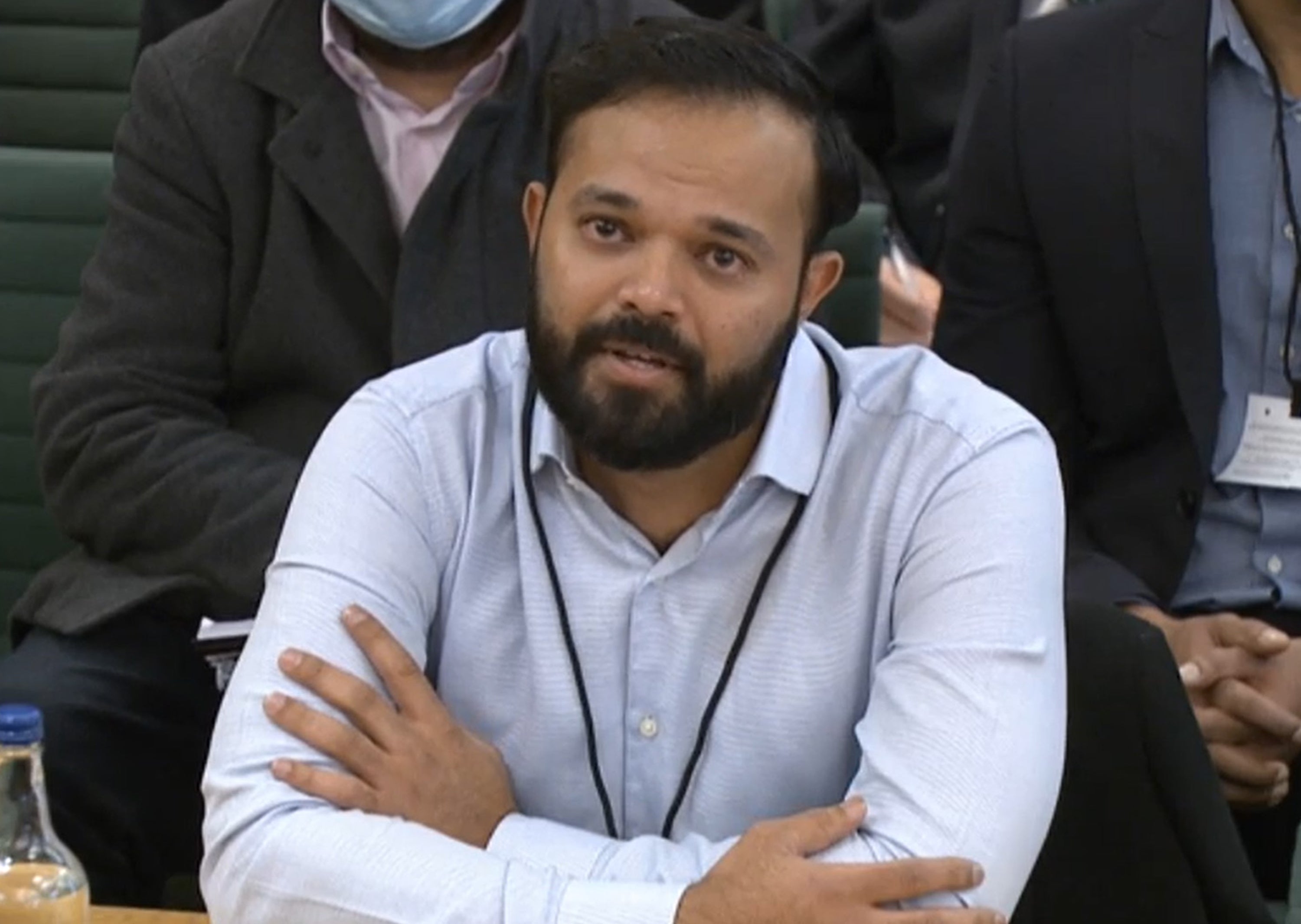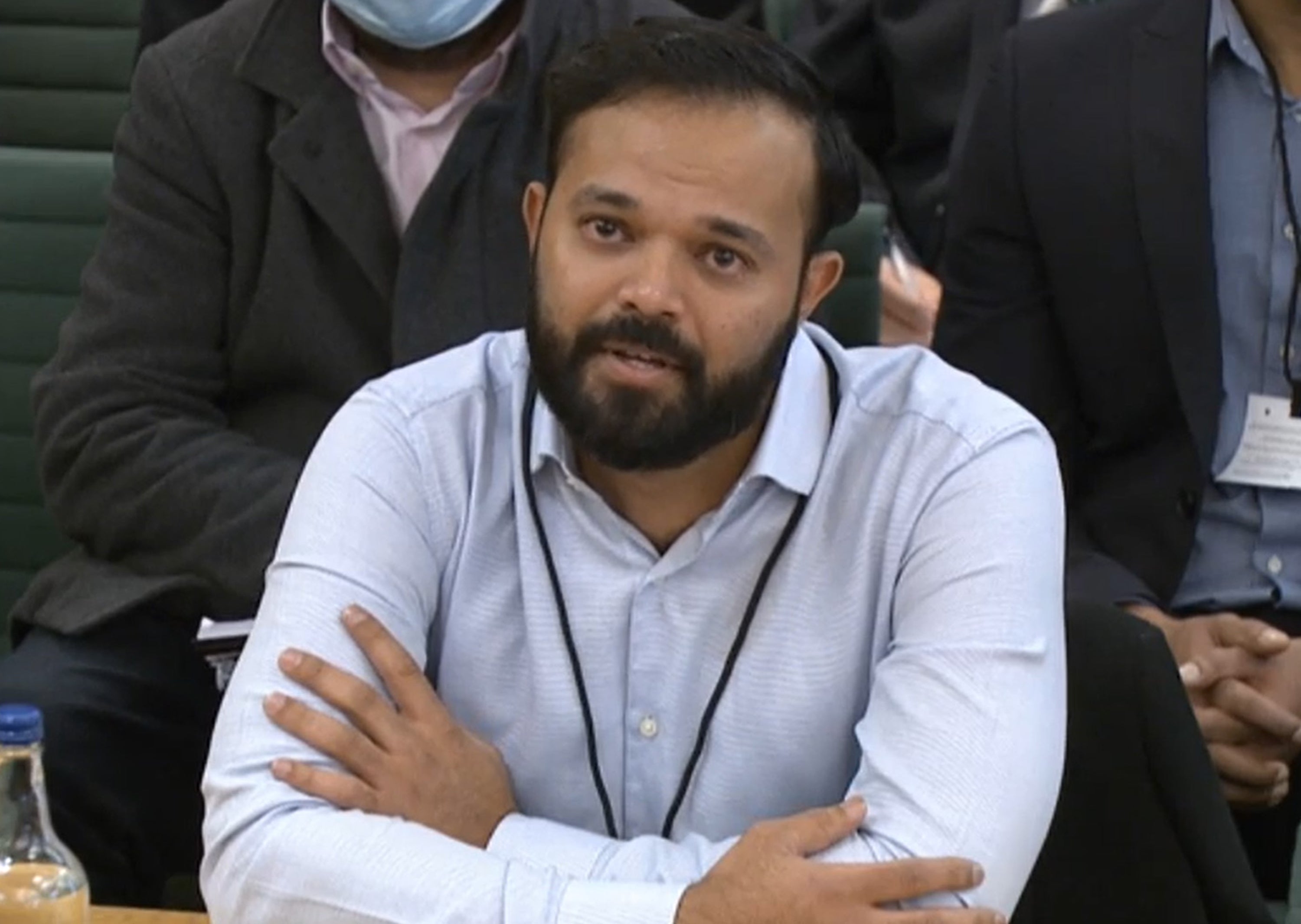English cricket warned it could lose public funding if it fails to tackle racism crisis
Yorkshire’s right to host international matches has been suspended
The Digital, Culture, Media and Sport Committee has urged the government to withhold future public funding for English cricket should it fail to show progress in tackling racism within the sport.
In a report titled “Racism In Cricket”, based on the findings emanating from the DCMS meeting on 16 November, in which Azeem Rafiq spoke for around two hours of his experience of racism while at Yorkshire County Cricket Club, the committee reiterated their dismay at Rafiq’s testimony and subsequent evidence relayed. Among many conclusions drawn was that “anyone involved in cricket should have been aware of the underlying racism throughout the game”.
The report is particularly damning of the England and Wales Cricket Board, citing that “governance within the sport had failed in some fundamental manner”. It also includes extracts of a letter from sports minister Nigel Huddleston who stated the government will be scrutinising the ECB’s “progress and leadership in this matter” and are willing to take action if they perceive a lack of reasonable movement.
“We, like the Minister, are watching closely and fully intend to ensure that cricket cleans up its act,” surmised the report, which has been ratified by the 11 members of parliament who sit on the committee, including DCMS chair Julian Knight. “We recommend that the Government ensures that any future public funds for cricket are dependent on continuous, demonstrable progress in getting rid of racism in both the dressing rooms and on the stands.”
A key recommendation is for the ECB to establish key indicators which can measure this progress and report back to the government every quarter. The first stage of this will be in early 2022 when the ECB, as well as Yorkshire, must give evidence on what measures and actions have been put in place.
Recommended
So far, the ECB has set up The Independent Commission for Equity in Cricket, which has been inundated with thousands of complaints in relation to all 18 counties. It has also stripped Yorkshire of the right to host major matches pending the meeting of certain conditions by early spring. The club has also sacked 16 members of staff, including director of cricket Martyn Moxon and first-team coach Andrew Gale. New chair Lord Kamlesh Patel settled an employment tribunal with Rafiq and then set up a whistleblowing hotline at the club.
Azeem Rafiq, giving evidence at the DCMS meeting in November, said the committee ‘has listened and taken sensible action’
Huddleston’s extracts also mention the prospect of an independent regular for cricket, which was brought up by the committee in November. Although he does not feel that is necessary right now – “I believe that sports should be given every opportunity to run their own affairs wherever possible” – he did not rule it out going forward.
“If other actions do not result in meaningful change it remains an option that I will consider as part of a range of wider options around governance and regulation,” he said.
In response to the report, Barry O’Brien, interim ECB chair, commented: “We welcome the committee’s recommendations and the focus of Julian Knight and committee members on achieving real change.
“We also embrace the ongoing scrutiny of the committee and all those that love the game of cricket who will be watching closely as we undertake the continuous, demonstrable, progress in eradicating racism from the dressing room and from the stands. We are determined to root out racism – and other forms of discrimination – from our sport.
“We look forward to updating the committee on the progress the whole game is making in delivering the 12-point action plan agreed in November to bring about the meaningful change we all want to see. We agree that sharing regular, public updates on our progress is important to rebuilding trust in our sport.
“We had already taken important steps to make cricket more inclusive in recent years – including our 2018 South Asian Action Plan, our 2019 Inspiring Generations strategy to make cricket a game for everyone, and launching the Independent Commission for Equity in Cricket in early 2021 –– however, we recognise that more needs to be done.
“We are deeply sorry for the pain people have suffered and recognise the courage it has taken to speak out. By working with the game to deliver the action plan, and continuing to listen and learn from people’s experiences, we are determined to make cricket a stronger, more welcoming sport.”
Rafiq also welcomed the findings and recommendations. It was in August 2020 he first went public with his claims during an interview with Wisden.com. The report expressed alarm at how matters developed from then, particularly Yorkshire’s independent report which upheld some of Rafiq’s claims but decided to take no action. “It was inconceivable to us that, despite upholding claims of racial discrimination, the club offered nothing more than heartfelt apologies.”
Rafiq in his own statement said: “The DCMS committee has listened and taken sensible action. It is absolutely brilliant that Julian Knight and his colleagues on the committee are going to hold the ECB to account every quarter. This shows just how seriously politicians are taking an issue that too many people in cricket ignored for so long. The committee understands how important it is to clean up the game.
“The additional hearing proposed, in which the ECB and Yorkshire Country Cricket Club will be required to give evidence on their progress, is also good news. They need to be given the chance to do the right thing and I’m encouraged by Lord Patel’s work since he was appointed chair at YCCC.
“I’m glad that MPs will monitor any progress, so that the reforms needed to make the sport inclusive to all youngsters can happen soon.”
This marks another step towards vindication for Rafiq, who had carried the burden of this ordeal squarely on his shoulders. It was particularly instructive that the committee noted the reaction against Rafiq, expressed both to them as members and in the public domain.
Recommended
Stories emerged which forced the 30-year-old to accept his own shortcomings, including historic anti-Semitic tweets from 2011 that led to an unreserved apology. It indicated just how tough broader change in cricket, not just at changing room and administrative level, will be.
“The language used in correspondence received by members of our Committee subsequent to the evidence session with Azeem Rafiq, and the manner in which stories were run in the press to discredit Azeem, further establish, to us, that eradicating racism from the game will be a long and difficult road. It does not matter if a whistle-blower is of perfect moral character but whether the issue raised is valid.”
Registration is a free and easy way to support our truly independent journalism
By registering, you will also enjoy limited access to Premium articles, exclusive newsletters, commenting, and virtual events with our leading journalists
{{#verifyErrors}} {{message}} {{/verifyErrors}} {{^verifyErrors}} {{message}} {{/verifyErrors}}
By clicking ‘Create my account’ you confirm that your data has been entered correctly and you have read and agree to our Terms of use, Cookie policy and Privacy notice.
This site is protected by reCAPTCHA and the Google Privacy policy and Terms of service apply.
Already have an account? sign in
By clicking ‘Register’ you confirm that your data has been entered correctly and you have read and agree to our Terms of use, Cookie policy and Privacy notice.
This site is protected by reCAPTCHA and the Google Privacy policy and Terms of service apply.
Source: Read Full Article






